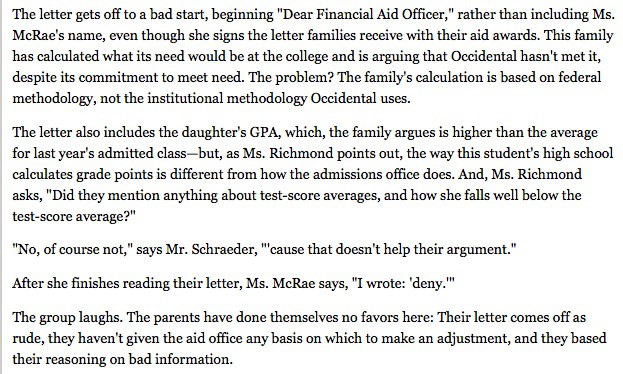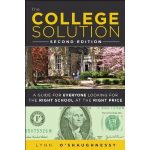When you appeal a college’s financial aid award what happens to your request?
During the last admission season, The Chronicle of Higher Education provided an inside glimpse into how a financial aid appeal is handled internally in a fascinating article entitled:
When Families Ask Colleges for More Money
A Chronicle reporter observed financial aid deliberations that took place among senior admission and financial aid staff at Occidental College, a liberal arts college in Los Angeles. Just like many other colleges and universities across the country, Occidental has seen the number of financial aid appeals increase since the recession. Last year half of the 1,600 families that applied for aid at Occidental appealed their awards.
I should mention that Occidental has excellent financial aid policy. It’s one of only about four or five dozen schools in the country that meet 100% of a family’s demonstrated financial need. There are many reasons, however, why parents won’t think the school, as generous as it is, has given enough.
One of the cases that the reporter observed involved a would-be freshman, who is a baseball player, who needed more money because his dad’s construction business went belly up after the aid application had been filed. The committee also reviewed a letter from a teenager who explained that both her parents have a gambling problem. Their gambling earnings were more than offset by their gambling losses. The college decided it wanted to help both students.
Merit Scholarship Deliberations
Affluent families seeking more merit money, however, experienced a much tougher time with the Occidental staff. The school rarely increases a merit scholarship that’s awarded to a student who needs no financial help. The staff, for instance, rejected the request of a wealthy student and recruited athlete, who had given Occidental proof of merit awards from other colleges. “This person should be ashamed,” said the director of financial aid, who added, “What this family paid in taxes last year would cover tuition all four years.”
One of the take-home messages of this article is that a teenager should apply to schools where he or she will be warmly welcomed. When a college accepts an applicant that it highly regarded, the staff is more likely to be generous. In other words, think twice before applying to a reach school. If you don’t know what a reach school is, here are posts that explains the concept:
Beware of Preferential Packaging
Should You Apply to a Reach School?
The Wrong Way to Appeal a Financial Aid Award
The article also provides pointers from Maureen McRae, Occidental’s director of financial aid, on how not to file a financial appeal letter. Here is an excerpt:

Lynn O’Shaughnessy is the author of the second edition of The College Solution, which is now available for 

How many of those financial aid appeals actually get overturned? seems like a lot of work to prove you need the aid.
One thing I’ve hoped for over the last couple of years is that the ABA would offer live video streaming of the conference presentationsor at the very least put them up on YouTube after the conference is over. The materials can be good, but it’s hard to replace good presentations with words on paper.
Staying humble and honest in financial aid appeal letters is so important. Great tip about addressing the letter to the person who signed the award letter instead of just “Dear Financial Aid Officer.”
I totally agree with you Monica.
Lynn O’Shaughnessy